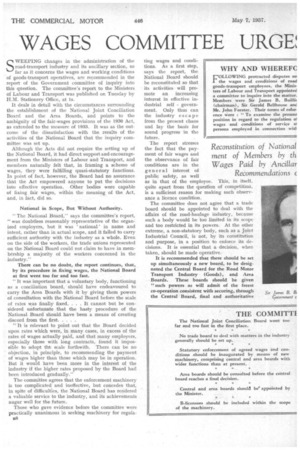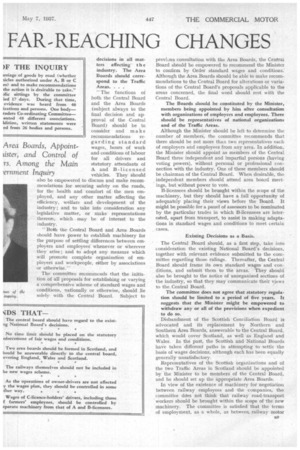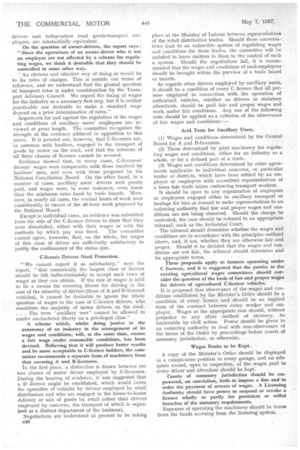WAGES COMMITTEE URGE FAR REACHING CHANGES
Page 42

Page 43

Page 44

If you've noticed an error in this article please click here to report it so we can fix it.
SWEEPING changes in the administration of the road-transport industry and its ancillary section, so far as it concerns the wages and working conditions of goods-transport operatives, are recommended in the report of the Government committee of inquiry into this question. The committee's report to the Ministers of Labour and Transport was published on Tuesday by H.M. Stationery Office, at 1s.
It deals in detail with the circumstances surrounding the establishment of the National Joint Conciliation Board and the Area Boards, and points to the ambiguity of the fair-wages provisions of the 1930 Act, as extended to the measure of 1933. It was as the outcome of the dissatisfaction with the results of the activities of the National Board that the inquiry committee was set up.
Although the Acts did not require the setting up of the National Board, it had direct support and encouragement from the Ministers of Labour and Transport, and members naturally felt that, in framing a scheme of wages, they were fulfilling quasi-statutory functions. In point of fact, however, the Board had no assurance that the Act empowered anyone to put the decisions into effective operation. .Other bodies were capable of fixing fair wages, within the meaning of the Act, and, in fact, did so.
National in Scope, But Without Authority.
" The National Board,says the committee's report, " was doubtless reasonably representative of the organized employers, but it was ` national ' in name and intent, rather than in actual scope, and it failed to carry sufficient authority with the industry as a whole. Even on the side of the workers, the trade unions represented on the National Board could not claim to have in membership a majority of the workers concerned in the industry."
There can be no doubt, the report continues, that, by its procedure in fixing wages, the National Board at first went too far and too fast.
"It was important that a voluntary body, functioning as a conciliation board, should have endeavoured to carry the Area Boards with it by giving them powers of consultation with the National Board before the scale of rates was finally fixed. . . . It cannot but be considered unfortunate that the hasty procedure of the National Board should have been a means of creating
discord from the first "It is relevant to point out that the Board decided upon rates which were, in many cases, in excess of the rates of wages actually paid, and that many employers, especially those with long contracts, found it impossible to adopt the scale forthwith. There can be no objection, in principle, to recommending the payment of wages higher than those which may be in operation. But it would have been more in the interest of the industry if the higher rates proposed by the Board had been introduced gradually."
The committee agrees that the enforcement machinery is too complicated. and ineffective, but concedes that, in spite of difficulties, the National Board has rendered a valuable service to the industry, and its achievements augur well for the future.
Those who gave evidence before the committee were practically unanimous in seeking machinery for regula
egula ting
ting wages and conditions. As a first step, says the report, the National Board should be reconstituted so that its activities will promote an increasing interest in effective industrial self government. Only thus can the industry escape from the present chaos and lay the basis for sound progress in the future.
The report stresses the fact that the payment of fair wages and the observance of fair conditions are in the general interest of public safety, as well as in that of the employee. This, in itself, quite apart from the question of competition, is a sufficient reason for making such observance a licence condition.
The committee does not agree that a trade board should be appointed to deal with the affairs of the road-haulage industry, because such a body would be too limited in its scope and too restricted in its powers. At the other extreme, a non-statutory body, such as a Joint Industrial Council, is not, by its constitution and purpose, in a position to enforce its decisions. It is essential that a decision, when taken, should be made operative.
It is recommended that there should be set up simultaneously a new board, to be designated the Central Board for the Road Motor Transport Industry (Goods), and Area Boards. These boards should be given "such powers as will admit of the freest co-operation consistent with securing, through the Central Board, final and authoritative
" The functions of both the Central Board and the Area Boards (subject always to the final decision and approval of the Central Board) should be to consider and make recommendations regarding standard wages, hours of work and conditions of labour for all drivers and statutory attendants of A and B-licensed vehicles. They should also be empowered to discuss and make recommendations for securing safety on the roads, for the health and comfort of the men employed, and any other matter affecting the efficiency, welfare and development of the industry ; and to take into consideration any legislative matter, or make representations thereon, which may be of interest to the industry.
"Both the Central Board and Area Boards should have power to establish machinery for the purpose of settling differences between employers and employees: whenever or wherever they arise;, and to adopt any measure which will promote complete organization of employers and workpeople, either by associations or otherwise."
The committee recommends that the initiation of all proposals for establishing or varying a comprehensive scheme of standard wages and conditions, nationally or otherwise, should :lie solely with the Central Board. Subject to
Area Boards, Appointtister, and Control of rs, Among the Main 'ernment Inquiry
previous consultation with the Area Boards, the Central Board should be empowered to recommend the Minister to confirm by Order standard wages and conditions. Although the Area Boards should be able to make recommendations to the Central Board for alterations or variations of the Central Board's proposals applicable to the areas concerned, the final word should rest with the Central Board.
The Boards should be constituted by the Minister, members being appointed by him after consultation with organizations of employers and employees. There should be representatives of national organizations and of the Traffic Areas.
Although the Minister should be left to determine the number of members, the committee recommends that there should be not more than two representatives each of employers and employees from any area. In addition, the Minister should appoint as members of the Central Board three independent and impartial persons (having voting powers), without personal or professional connection with the industry. One of these members should be chairman of the Central Board. When desirable, the _ independent members should attend area board meetings, but without power to vote.
B-licensees should be brought within the scope of the machinery, but they should have a full opportunity of adequately placing their views before the Board. It might be possible for a panel of assessors to be nominated by the particular trades in which B-licensees are interested, apart from transport, to assist in making adaptations in standard wages and conditions to meet certain cases.
Existing Decisions as a Basis.
The Central Board should, as a first step, take into consideration the existing National Board's decisions, together with relevant evidence submitted to the committee regarding those rulings. Thereafter, the Central Board should frame its own standard wages and conditions, and submit them to the areas. They should also be brought to the notice of unorganized sections of the industry, so that they may communicate their views to the Central Board.
The committee does not agree that statutory regula tion should be limited to a period of five years. It suggests that the Minister might be empowered to withdraw any or all of the provisions when expedient to do so.
Disbandment of the Scottish Conciliation Board is advocated and its replacement by Northern and Southern Area Boards, answerable to the Central Board, which would cover Scotland, as well as England and Wales. In the past, the Scottish and National Boards have taken different paths in attempting to settle the basis of wages decisions, although each has been equally generally unsatisfactory.
Representatives of the Scottish organizations and of the two Traffic Areas in Scotland should be appointed by the Minister to be members of the Central Board, and he should set up the appropriate Area Boards. '
In view of the existence of machinery for negotiation between railway employees and the companies, the committee does not think that railway road-transport workers should be brought within the scope of the new machinery. The committee is satisfied that the terms of employment, as a whole, as between_ railway motor drivers and independent road goods-transport cmoloy,ees, are substantially equivalent.
On the question of owner-drivers, the report says : "Since the operations of an owner-driver who is not an employer are not affected by a scheme for regulating wages, we think it desirable that they should be controlled in some other way.
"An obvious and effective way of doing so would be to fix rates of charges. This is outside our terms of reference, and we understand that the general question of transport rates is under consideration by the Transport Advisory Council. We regard the fixing of wages for the industry as a necessary first step, but it is neither practicable nor desirable to make a standard wage depend on a prior determination of rates."
Arguments for and against the regulation of the wages and conditions of ancillary users' employees are reviewed at great length. The committee recognizes the strength of the evidence adduced in opposition to this move. It is pointed out, however, that C-licensees are, in common with hauliers, engaged in the transport of goods by motor on the road, and that the interests of all three classes of licensee cannot be severed.
Evidence showed' that, in many cases, C-licensees' drivers' wages were comparable with those received by hauliers' men, and even with those proposed by the National Conciliation Board. On the other hand, in a number of cases, ancillary users' drivers were poorly paid, and wages were, in some instances, even lower than the minimum rates fixed by trade boards. Moreover, in nearly all cases, the normal hours of work were considerably in excess of the 48-hour week proposed by the National Board.
Except in individual cases, no evidence was submitted from the side of the C-licence drivers to show that they were dissatisfied, either with their wages or with the
methods by which pay was fixed. The committee cannot agree, however, that, on the whole, the wages of this class of driver are sufficiently satisfactory to justify the continuance of the status quo.
C-licence Drivers Need Protection.
"We cannot regard it as satisfactory," says the report, "that numerically the largest class of drivers should be left indiscriminately to accept such rates of wages as they can obtain. If the rate of wages is held' to be a means for ensuring fitness for driving in the case of the minority of drivers (those of A and B-licensed vehicles), it cannot be desirable to ignore the whole question of wages in the case of C-licence drivers, who constitute the majority of motor drivers on the road. . . . The term 'ancillary user' cannot be allowed to confer unchartered liberty on a privileged class."
A scheme which, whilst doing justice to the autonomy of an industry in the arrangement of its wages and conditions, will, at the same time, ensure a fair wage under reasonable conditions, has been devised. Believing that it will produce better results and be more acceptable to C-licence holders, the committee recommends a separate form of machinery from that covering A and B-licensees.
In the first place, a distinction is drawn between the two classes of motor driver employed by C-licensees. During the hearing of evidence, it was suggested that a D licence might be established, which would cover the operation of vehicles by drivers employed by retail, distributors and who are engaged in the house-to-house delivery or sale of goods by retail (other than drivers employed by concerns, the transport of which is organized as a distinct department of the business).
Negotiations are understood at present to be taking 1510
place at the Ministry of Labour between represeniatives of the retail distributive trades. Should these conversations lead to an enforcible system of regulating wages and conditions for these trades, the committee will be satisfied to leave matters in them to the control of such a system. Should the negotiations fail, it is recommended that the wages and conditions of such employees should be brought within the purview of a trade board or boards.
As regards other drivers employed by ancillary users, it should be a condition of every C licence that all persons employed in connection with the operation of authorized vehicles, whether as drivers or statutory attendants, should be paid fair and proper wages and work under fair conditions. Any one of the following tests should be applied as-a criterion of the observance of fair wages and conditions :—
Acid Tests for Ancillary Users.
(1) Wages and conditions determined by the Central Board for A and B-licensees.
(2) Those determined by joint machinery for regulating wages and conditions, either for an industry as a whole, or for a defined part of a trade.
(3) Wages and conditions determined by other agreements applicable to individual concerns, or particular trades or districts, which have been settled by an employer or employers with accredited representatives of a bona fide trade union embracing transport workers.
It should be open to any organization of employers or employees engaged either in ancillary transport or haulage for hire or reward to make representations to an enforcing authority that fair and proper wages and conditions are not being observed. Should the charge be contested, the case should be referred to an appropriate tribunal, such as the Industrial Court.
The tribunal should determine whether the wages and conditions are in accordance with the principles outlined above, and, if not, whether they are otherwise fair and proper. Should it be decided that the wages and conditions are not fair, the tribunal should determine and fix appropriate terms.
These proposals apply to farmers operating under C licences, and it is suggested that the parties to the existing agricultural wages committees should consider the question of the basis of fair and proper wages for drivers of agricultural C-licence vehicles.
It is proposed that observance of the wages and conditions established by the Minister's Order should be a condition of every licence -and should be an implied term of the contract between every worker and employer. Wages at the appropriate rate should, without prejudice to any other method of recovery, be retrievable by civil action. Power should be given to an enforcing authority to deal with non-observance of the terms of the Order by proceedings before courts of summary jurisdiction, or otherwise..
WagesBooks to be Kept.
A copy of the Minister's Order should be displayed in a conspicuous position in every garage, and an adequate record, open to inspection, of the wages paid to every driver and attendant should be kept:
Courts of summary jurisdiction should be empowered, on conviction, both to impose a fine and to order the payment of arrears of wages. A Licensing Authority should have power to suspend or revoke a licence wholly or partly for persistent or wilful breaches of the statutory requirements.
Expenses of operating the machinery should be borne from the funds accruing from the licensing system.




















































































